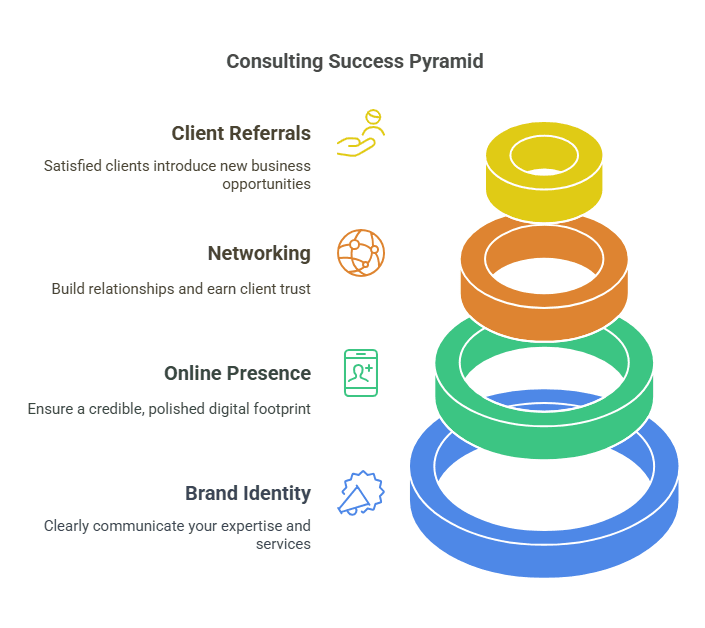Ever wondered why companies like Apple, Amazon, and even small startups hire consultants? Because the right advice can mean the difference between growth and failure. Businesses constantly face challenges whether it’s cutting costs, improving efficiency, or navigating a major transition. They need experts who can solve problems, boost profits, and make their toughest decisions easier.
That’s where management consultants come in. If you have experience in business, leadership, or a specialized field, you can turn your knowledge into a profitable consulting business. The best part? Consulting requires low startup costs, no inventory, and offers high-income potential.
But where do you start? This guide will walk you through every step from choosing your niche and setting up your business to finding clients and scaling your services.
Understanding the Management Consulting Industry
What Is Management Consulting?
At its core, management consulting is about helping businesses improve performance. Companies hire consultants for expert advice, fresh insights, and strategic solutions.
Consulting can cover many areas, including
- Strategy Consulting – Helping businesses expand, pivot, or enter new markets.
- Operations Consulting – Improving efficiency and reducing unnecessary costs.
- HR & Leadership Consulting – Talent development, leadership training, and team building.
- IT & Digital Transformation Consulting – Implementing new technologies and improving cybersecurity.
- Financial & Risk Advisory – Budgeting, cost reduction, and compliance.
Choosing the Right Business Model
Not every consulting business operates the same way. Some consultants work solo, while others build full-scale firms. Which one is right for you? Let’s break it down
- Solo Consultant – Low overhead and full control, but requires strong networking.
- Boutique Firm – Small team, specialized services, and more capacity for projects.
- Larger Firm – Higher expenses, more employees, and the ability to handle large clients.
Each model has its advantages. Solo consultants keep all their profits but must manage every aspect of the business. Boutique firms can take on bigger projects while still maintaining a personal touch.
Is There Demand for Consultants?
Absolutely. Businesses in industries like healthcare, technology, finance, and sustainability are constantly looking for expert guidance. Trends like AI, automation, and remote work are creating even more demand for specialized consultants.
If you have the expertise to help businesses cut costs, increase efficiency, or drive growth, you’re already in demand.
Preparing to Launch Your Consulting Business

Choosing Your Niche
One of the biggest mistakes new consultants make is trying to do too much. Specializing in one area makes it easier to attract the right clients. Clients trust specialists over generalists. Choosing a niche helps you stand out, charge higher fees, and attract the right clients.
Ask yourself:
- What industries have I worked in?
- What business problems do I solve best?
- Where is there a proven demand for consulting services?
For example, if you have a background in finance, you might specialize in helping small businesses manage cash flow and reduce expenses. If you’re experienced in HR, you could focus on leadership training or team building.
Researching the Market
Before launching, you need to confirm that businesses are willing to pay for your expertise. Research your competitors, look at their pricing, and find gaps in the market.
Some ways to test demand
- Join industry groups and forums to see what challenges businesses face.
- Conduct surveys or interviews with potential clients.
- Offer free strategy calls to gauge interest.
Legal and Financial Setup
Every business needs a legal foundation. To operate legally and professionally, take these steps:
- Choose a Business Structure:
- Sole Proprietorship – Simple but higher personal liability.
- LLC – Provides legal protection and tax flexibility.
- Corporation – Best for long-term scaling but more complex.
- Register Your Business: Get the necessary licenses in your state.
- Set Up Business Banking: Open a business bank account to separate personal and business finances.
- Understand Taxes: Work with an accountant to set up bookkeeping and tax filing.
Creating a Business Plan
Your consulting business plan doesn’t need to be long, but it should cover the essentials.
- Who is your ideal client? (Industry, business size, specific needs)
- What services will you offer? (Strategy, operations, HR, etc.)
- How will you charge? (Hourly, per project, or retainer model)
- How will you find clients? (Networking, cold outreach, digital marketing)
A simple, well-thought-out plan keeps you focused and helps secure funding if needed.
3. Building Your Brand and Marketing Your Consulting Business
Creating a Strong Brand Identity
Consulting is all about trust. Your brand should clearly communicate who you help and how you help them.
Key elements of a strong brand:
- A Clear Message: Define your expertise and unique selling point.
- A Professional Website: Your online storefront, showcasing your expertise and testimonials.
- Consistent Branding: A clean logo, professional colors, and a matching business email.

Building an Online Presence
Potential clients will search for you online before reaching out. Make sure they find a credible, polished presence.
Must-haves for your website:
- A homepage with a clear value proposition.
- A services page outlining your offers.
- Case studies or testimonials proving your expertise.
- A blog or resource section for thought leadership.
Active LinkedIn engagement can also drive leads comment on industry posts, share insights, and connect with potential clients.
Networking and Client Relationships
Clients don’t just appear you need to build relationships and earn trust.
Some of the best networking strategies:
- Attend industry events and conferences.
- Join local business organizations and online groups.
- Stay in touch with past colleagues and contacts.
Referrals are a goldmine for consultants. A satisfied client will often introduce you to other businesses. Stay in touch and keep relationships strong.
Acquiring Clients and Setting Your Fees
How to Get Clients as a Consultant
Clients won’t just come to you you need a strategy. Best ways to attract clients:
- Cold outreach: Personalized emails to decision-makers.
- Inbound marketing: Blog posts, case studies, and industry insights.
- Strategic partnerships: Team up with accountants, HR firms, or lawyers who work with your ideal clients.
Setting Your Fees
Your pricing model depends on your expertise, market rates, and service type.
Common pricing structures:
- Hourly Rate – Best for small projects but limits scalability.
- Project-Based Pricing – A set fee for defined work.
- Retainer Model – Ongoing consulting for a monthly fee (ideal for consistent income).
Research competitors, but don’t undercharge clients pay for results, not just time.
Managing Client Expectations
A happy client is a repeat client. Keep communication clear, set realistic expectations, and deliver value quickly. Regular check-ins help ensure everyone stays on the same page.
5. Scaling Your Consulting Business
Expanding Your Services
As your business grows, consider adding:
- Online courses or training programs.
- Corporate workshops or leadership coaching.
- Subscription-based consulting for ongoing support.
Hiring and Building a Team
If demand increases, consider outsourcing or hiring additional consultants. A small, reliable team allows you to take on larger projects while maintaining quality.
Automating Operations
Use CRM software, email automation, and project management tools to streamline client onboarding, contracts, and reporting. Less admin work means more time for clients and growth.
Final Thoughts
Starting a management consulting business isn’t complicated it just takes the right strategy and a willingness to take action. The first step? Pick your niche, build your brand, and start reaching out to potential clients today.
No website yet? Start with LinkedIn. No clients yet? Offer a free strategy session to get your foot in the door. Success in consulting comes from solving real business problems, building trust, and positioning yourself as the go-to expert in your field.
But you don’t have to do it alone. If you need expert guidance on launching or growing your consulting business, I can help. As a business coach, I specialize in helping entrepreneurs like you build a profitable, sustainable consulting practice one that attracts the right clients, sets the right pricing, and grows without burnout.
Whether you’re struggling with positioning your services, finding clients, or scaling your business, I offer personalized coaching to help you take the right steps faster and with more confidence.
Ready to turn your expertise into a thriving consulting business? Let’s talk. Book a free strategy session today and take the first step toward building a business that works for you.





